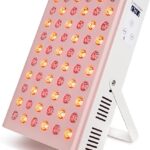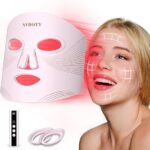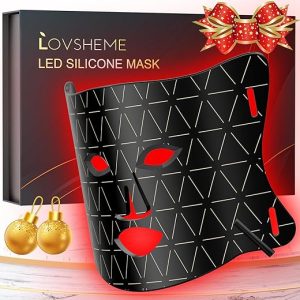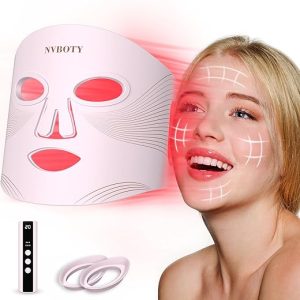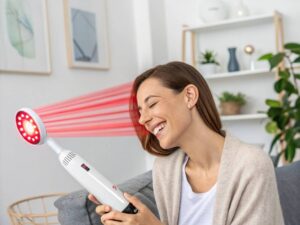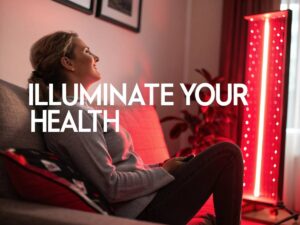Harnessing the power of red light therapy, athletes and marathon enthusiasts now have a secret weapon to boost recovery and performance.
Imagine a therapy that not only accelerates muscle repair after grueling workouts but also enhances energy production, reduces inflammation, and improves sleep quality.
This revolutionary treatment uses photobiomodulation to awaken your cellular powerhouses—your mitochondria—ensuring quicker recovery and better endurance.
Whether you’re preparing for a marathon or seeking a post-workout recovery boost, this article dives into how red light therapy transforms your training regimen and optimizes athletic performance.
Get ready to light up your recovery journey!
Red Light Therapy Overview
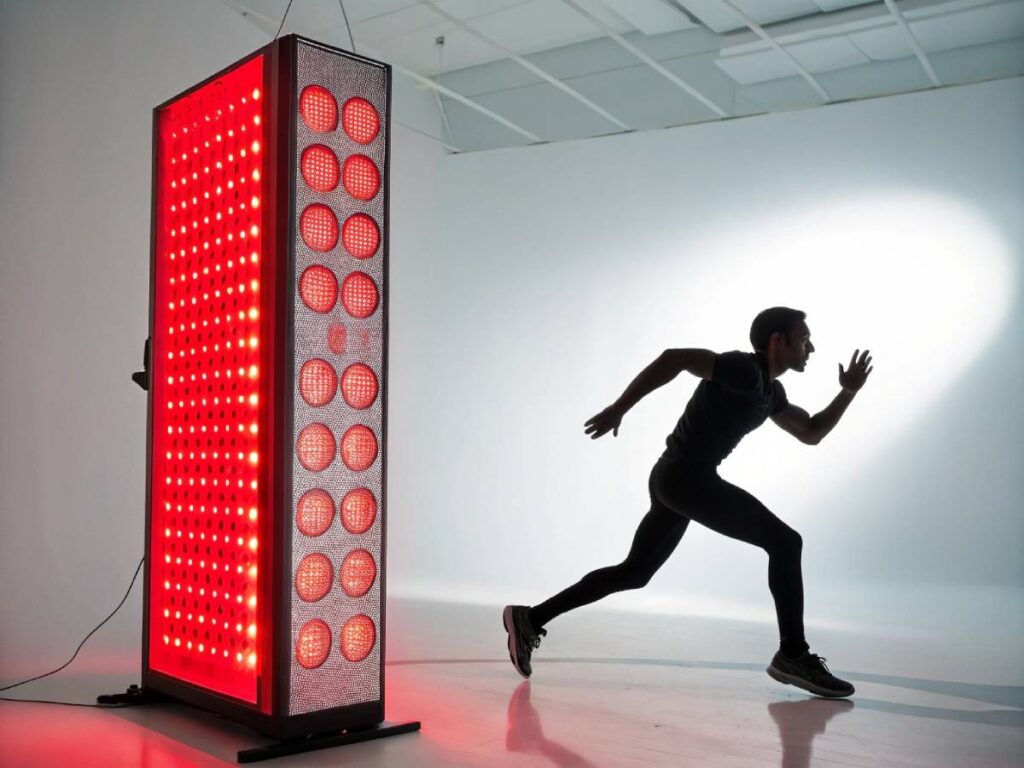
Red Light Therapy Benefits
For marathon junkies and sports enthusiasts, red light therapy might just be the magic wand to amp up their game. Here’s how this glowing marvel can make a difference:
- Muscle Recovery: Waves goodbye to sore muscles after those grueling runs or intense gym days. How? By helping muscles patch up and regrow. A thumbs-up move for marathon lovers tackling that long-distance grind.
- Energy Boost: Shows some love to those mitochondria, the cell’s personal powerhouses, ramping up energy levels. A must-have secret weapon for athletes pushing their limits (Cleveland Clinic).
- Taming Inflammation: Calms the fire of inflammation, thanks to its knack for getting the blood moving and easing oxidative stress (Recharge Health).
- Better Sleep: Helps catch those Z’s, crucial for hardcore training and recovery.
- Performance Perk: Hits the fast-forward on recovery and reduces muscle drain, so athletes can power up their game during speed trials.
Discover even more about what this therapy can do in our piece on red light therapy for athletes.
Mechanism of Action
What’s the magic behind red light therapy? It’s all about photobiomodulation (PBM) — a fancy term for how red or near-infrared light gets cells buzzing. Here’s the lowdown:
- Mitochondrial Motivation: Zeroes in on mitochondria, the cell’s little engines. By cranking up their activity, it ramps up ATP production — the fuel for cells, which is key for fixing tissues and helping them regrow.
- Fixing and Building: PBM is like a mini repair crew, speeding up healing and muscle repair. It pumps up muscle action, keeps fatigue at bay, and throws an extra punch into overall athletic power (NCBI).
Curious just what changes red light therapy brings to muscle studies? Check this out:
| Thing | Impact |
|---|---|
| Fatigue | Hit the brakes |
| Reps | Pumped up |
| Torque | Cranked up |
| Muscle Growth | Given a lift |
| Creatine (CK) | Dialed down |
| Muscle Soreness | Pushed back |
Want to dive into the nitty-gritty and the science? Pop over to our page about red light therapy muscle recovery.
For athletes, there’s both pro-level red light machinery and handy red light gadgets to suit their schedule, be it pre-workout, post-workout, or rehab downtime. For the know-how on making the most of it, check out our red light therapy sports playbook.
Red Light Therapy and Exercise Performance
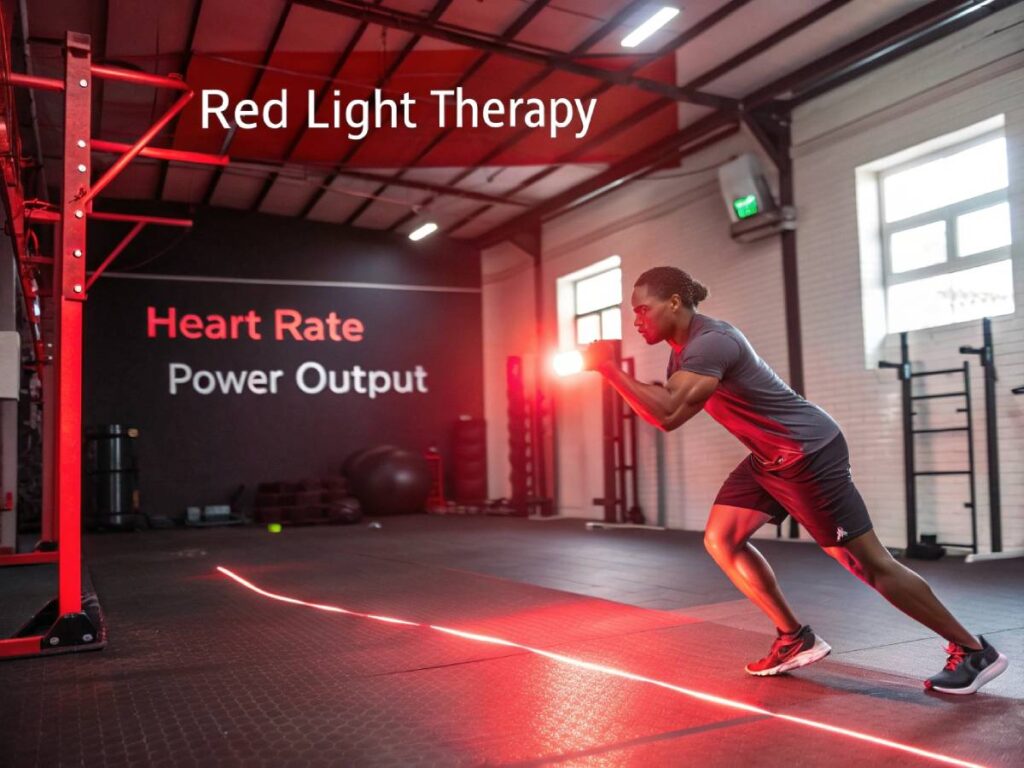
Red light therapy’s been getting lots of love from athletes looking to up their game and recover faster. Let’s dive into how this technique works wonders for folks like marathon runners and endurance enthusiasts.
Effects on Aerobic Capacity
Trying out red light therapy before hitting the gym can really crank up your aerobic capacity. It ramps up your VO2 max – both the regular and beefed-up versions. Basically, that’s your body’s ability to suck in and use oxygen when you’re really going for it (Marathon Handbook). Studies showed folks pushed themselves further before hitting the wall during max-effort workouts.
| Performance Metric | Improvement (%) |
|---|---|
| Relative VO2 Max | 12% |
| Absolute VO2 Max | 10% |
| Time Until Exhaustion | 15% |
| Anaerobic Threshold | 8% |
Impact on Muscle Strength
Red light therapy isn’t just about endurance; it’s packing some punch in the strength department too. Flash your muscles some of this light before pumping iron, and you’ll notice gains in strength, bigger muscles, and even improved grip—thanks to what science folks call photobiomodulation (PBM) (NCBI).
| Strength Metric | Improvement (%) |
|---|---|
| Muscle Growth | 20% |
| Muscle Thickness | 18% |
| Grip Strength | 12% |
Curious about bulking up those muscles? Check out more on red light therapy muscle growth.
Influence on Muscle Fatigue
Muscle fatigue’s the ultimate party pooper, especially when you’re trying to stay consistent. Hooking up with some red light before exercising helps fend off that exhaustion feeling. It tackles inflammation and gets your muscle cells working better, helping you go the distance without tiring out too soon. This is especially crucial for marathon runners who need to keep their stamina and power in check.
| Fatigue Metric | Improvement (%) |
|---|---|
| Muscle Fatigue Onset | 25% |
| Muscle Recovery Time | 30% |
Adding red light therapy to your workout magic can mean less tiredness and quicker bounce-back times. For those keen on getting nitty-gritty details, peek into our red light therapy sports protocols.
When all is said and done, red light therapy gives athletes an edge, boosting how they breathe, move, and resist fatigue. Dive into more athletic red light therapy routines and quick recovery tricks to hit your athletic targets.
Red Light Therapy for Muscle Recovery
Red light therapy (RLT) has proven to be a handy trick in the gym bag for athletes, fitness buffs, and physical therapists aiming to speed up muscle recovery. It’s like a little shining helper that aids in quicker and more effective muscle healing.
Calming the Flames and Stress
One of the big wins of RLT is its knack for dialing down inflammation and oxidative stress. This clever laser-like therapy uses red or near-infrared light to pep up and heal muscle tissue, calming inflammation markers like creatine kinase. This chill factor translates to faster recovery and better muscle mojo.
| What’s Measured | What Happens |
|---|---|
| Creatine Kinase Levels | Drops |
| Oxidative Stress Levels | Decreases |
Curious for more details? Pop over to our page on red light therapy muscle recovery.
Beefing Up
Turns out, RLT isn’t just about repair—it might also beef up your muscles. Research touts bigger gains in muscle size and strength when RLT is part of your pre-workout warm-up (Marathon Handbook). This is sweet news for athletes pushing to boost performance and pack on extra muscle.
Need device recommendations? Scope out our article on professional red light therapy equipment.
Patch-Up Power After Injury
RLT isn’t just there for the small stuff. When it comes to patch-up work after an injury, this therapy earns its stripes. PBM has shown to kick-start the body’s natural healing in damaged muscle tissue, meaning you can bounce back from injuries and hit the track sooner.
Looking for guidance on this? Peek at our guide on red light therapy sports protocols.
RLT shines as a top tool for getting athletes back on track, especially those knee-deep in hardcore activities like marathons. With its talent for soothing, growing, and healing muscles, it’s a must-have in an athlete’s recovery stash. For more on comparing RLT with other recovery techniques, check out red light therapy vs ice bath and when to use red light therapy workout to see how this therapy fits into your routine.
Red Light Therapy Pre-Workout
Ever wondered how to give your workout a turbo boost? Let’s shine a light on red light therapy! Athletes and fitness buffs are finding gold in the beam, with this therapy lending a hand to pump-up performance, keep muscles fresh for longer, and help build strength and stamina.
Enhanced Athletic Performance
Red light therapy isn’t just a red-hot trend; it’s a game-changer before you hit the gym. Studies show it amps up both types of VO2 max—meaning how much oxygen your body can use—delays that “running on empty” feeling and raises your effort bar. Imagine adding a lightning bolt to your workout stats:
| Performance Metric | Improvement |
|---|---|
| Relative VO2 Max | More oomph |
| Absolute VO2 Max | More power |
| Time Until Exhaustion | Pushed back |
| Anaerobic Threshold | Lifted |
Want the full scoop? Head on over to our breakdown of the best red light therapy for athletes.
Delayed Muscular Fatigue
Tired muscles cutting your sweat session short? Red light therapy is like a magic wand for such woes. Athletes who use this have longer-lasting energy and push through more reps. It’s like getting an energy refill before you even start (Marathon Handbook).
| Workout Performance | Improvement |
|---|---|
| Number of Repetitions | Bumped up |
| Performance Level | Kept high |
Muscle recovery tips? We’ve got those too, right here: red light therapy muscle recovery.
Increased Strength and Endurance
This therapy does more than just fend off fatigue—it’s your secret weapon for bulking up. Used pre-exercise, it speeds up healing and gets those muscles bouncing back quicker and tougher after injury. You want gains? Here they are, courtesy of Marathon Handbook.
| Benefit | Improvement |
|---|---|
| Muscle Growth | Up a notch |
| Strength Gains | Through the roof |
To learn about the gadgets pros use or specific athletic guidelines, check these pages: professional red light therapy equipment, red light therapy sports protocols.
Swapping sweat for shine is your new pre-gym ritual. Keep the gains coming! More tips? Just pop over here: when to use red light therapy workout.
Red Light Therapy Post-Workout
Getting your body back to its best after a tough workout is super important, and a lot of folks are jumping on the red light therapy bandwagon. Why? Because it’s helping athletes bounce back quicker after they push themselves hard, like during marathons, by tackling inflammation, speeding up healing, and dialing down muscle soreness.
Less Inflammation
Inflammation’s a real pain for anyone who hits it hard at the gym or on the track, and red light therapy is stepping up as a hero in that department. This treatment uses specific waves of red light to really dive into your skin and tissues, cranking up blood flow to those sore spots. When the blood is cruising through better, it brings more oxygen and goodies that your muscles need to recover. A solid piece from Bestqool backs this up, showing it’s pretty nifty at chopping down post-workout inflammation and pain.
Speeding up the Heal
Need to get back on your feet fast? Red light therapy can be your backup. It gets cells firing on all cylinders and ups collagen production, which are both big deals for fixing up tissues and keeping joints and muscles in good shape. With red light therapy in your corner, you’re looking at less time off from training due to injury. As said in the Marathon Handbook, slipping some therapy into your post-exercise rituals can supercharge muscle recovery, lopping off the risk of nasty, lasting injuries.
Sorer No More
No one likes waking up the day after leg day, right? That post-exercise ache, known as Delayed Onset Muscle Soreness (DOMS), is nothing but a speed bump for athletes trying to keep up their training vibe. Enter red light therapy. It pushes blood around and tames inflammation, meaning fewer muscle knots and pains. Want more nerdy details on how it helps? Check out our article on red light therapy and DOMS.
For those on a quest to find the best way to recover, getting the lowdown on different methods is key. Articles comparing red light therapy and ice baths or suggestions for portable red light gadgets can help you sort what’s right for you.
| What Red Light Therapy Does | How It Helps |
|---|---|
| Tame Inflammation | Boosts blood flow, cuts down swelling and pain |
| Speed Up Healing | Sparks collagen and cell production |
| Ease Soreness | Lowers DOMS and stiffness |
Anyone wanting to dig into how red light therapy can really boost your workout recovery game should pop over to our section on the best red light therapy for athletes for in-depth guides and tips.
Mixing red light therapy into your routine after a tough session can work wonders, slashing inflammation, pumping up healing speed, and kicking soreness to the curb, giving athletes a solid edge in their recovery journey.
Conclusion
In summary, red light therapy emerges as a game-changing recovery and performance enhancer for athletes, particularly for marathon enthusiasts and fitness buffs. The therapy’s ability to stimulate mitochondrial activity leads to faster muscle repair, increased energy levels, and a significant reduction in inflammation and oxidative stress.
Whether used as a pre-workout performance booster or a post-workout recovery aid, red light therapy ensures that your muscles receive the care they need to keep you at peak performance. By incorporating this innovative treatment into your training regimen, you not only minimize downtime but also push your performance boundaries further.
The comprehensive breakdown of improved VO2 max, increased muscle strength, and reduced muscle fatigue underscores the therapy’s potential. Embrace red light therapy as a versatile, science-backed solution to elevate your athletic journey, ensuring that every stride is fueled by enhanced recovery and vigor.
Final Thoughts
In wrapping up, red light therapy stands out as a scientifically-backed method to supercharge athletic performance and recovery. Its multifaceted benefits—from boosting energy at the cellular level to reducing post-workout inflammation—make it an indispensable tool for athletes striving for excellence.
Whether you are a marathon runner seeking faster recovery or a fitness enthusiast looking to push your limits, integrating red light therapy into your regimen could be the transformative change you need. The therapy not only aids in quicker muscle repair but also enhances overall performance metrics, ensuring that every training session is more effective.
Embrace this innovative approach, experiment with pre and post-workout routines, and witness the difference in your performance and recovery journey. Your body deserves the best support, and red light therapy might just be the key to unlocking new athletic heights.
Main Tips Around the Article
- Incorporate Routine: Use red light therapy consistently both before and after workouts.
- Monitor Progress: Track performance metrics such as VO2 max, muscle strength, and recovery time.
- Pair with Other Recovery Methods: Combine red light therapy with proper hydration, nutrition, and rest.
- Invest in Quality Devices: Choose certified red light therapy equipment to ensure safety and efficacy.
- Consult Professionals: Always seek expert advice before starting any new recovery regimen.
FAQs
What is red light therapy?
Red light therapy is a non-invasive treatment that uses low-level wavelengths of red or near-infrared light to stimulate cellular repair and reduce inflammation, aiding muscle recovery and overall performance.
How does red light therapy benefit athletes?
It enhances muscle recovery, increases mitochondrial energy production, reduces inflammation, and improves aerobic capacity and strength, making it ideal for pre and post-workout routines.
Is red light therapy safe for regular use?
Yes, red light therapy is generally considered safe for regular use, with minimal side effects when used according to guidelines. Always consult a healthcare professional for personalized advice.
Can red light therapy help with muscle soreness after intense workouts?
Absolutely. By reducing inflammation and accelerating tissue repair, red light therapy significantly alleviates muscle soreness and speeds up recovery.
Recommended Products and Accessories
- Red Light Therapy Panels:
- Joovv Solo Full-Body Red Light Therapy Device
- PlatinumLED Therapy Lights Biophoton Device
- Portable Red Light Gadgets:
- RedRush 360 Red Light Therapy Device
- Red Light Rising Mini Therapy Device
- Accessories:
- Protective Eyewear for Red Light Therapy
- Adjustable Therapy Stands
- Cleaning Kits for Device Maintenance
- Books and Guides:
- “The Science of Red Light Therapy” – Comprehensive guide for athletes
- “Maximizing Athletic Recovery” – Tips and protocols for integrating red light therapy



